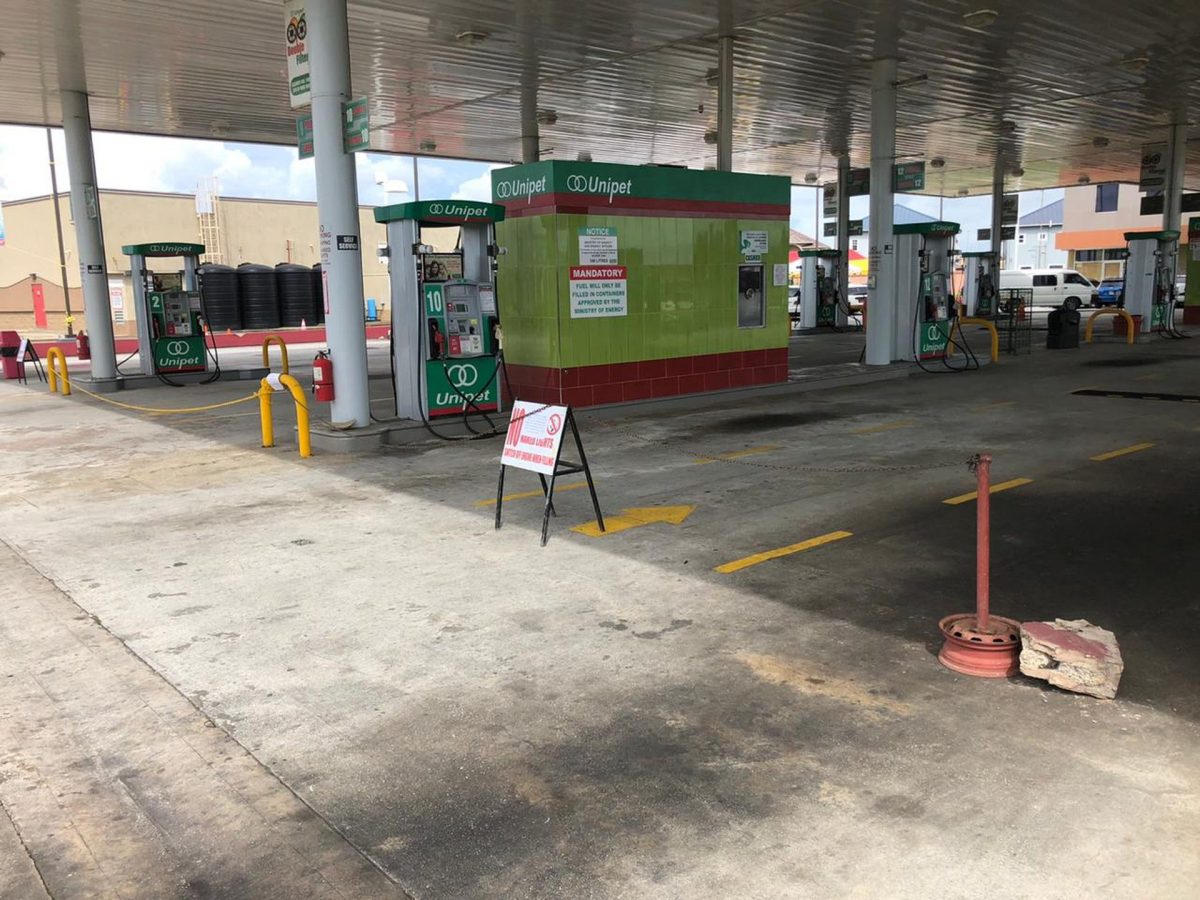(Trinidad Guardian) Thousands of drivers were affected yesterday as Unipet’s 21 service stations across the country remained closed when dealers sought to send a message to the Government that the profits they were making were way too low for them to consider staying in business.
The closure of the stations led to pressure on the 100-plus NP service stations that remained open as workers at those stations found themselves flooded with more vehicles than they usually catered for daily.
In some cases, fuel ran out at NP stations and those who felt the brunt of the burden were commuters, some of whom were forced to wait in long lines for well over an hour to get fuel.
When drivers showed up at the Unipet pumps yesterday morning, they were greeted with signs that stated “No Fuel Sales” or “We do apologise to our valued customers for the inconvenience. This is as a result of the dire financial realities of the sector. Over the past 4 years, we have made the best effort to avoid this consequence, but it is now beyond our control.”
One elderly motorist said he had to leave Princes Town to get gas in Cocoyea as the stations were closed. In Santa Flora, motorists who went to the Unipet station only needed to cross the street where the NP station was located.
In San Fernando, it was mostly in the earlier parts of the morning that caused congestion. Supply tankers were seen topping up the gas stations, ensuring continuity in supplies but motorists were worried that a further shutdown will cause people to panic and create long lines at the pumps.
In Central Trinidad, motorists were driving all over to fill their tanks, which created congestion in several areas. It was Unipet stations that were closed while NP retailers continued operations.
Unipet CEO Dexter Riley said that the company will have a challenge with its supply this week and that consumers could expect one or two hiccups in purchasing gas.
Riley noted that petroleum dealers across the market faced significant challenges over the past few years, which affected their ability to purchase gas to supply their customers.
“Since the levies were adjusted four years ago, things have been very burdensome for the dealers. Increased taxes and unsustainable margins also have been a concern for dealers. The industry has really been affected financially. Dealers have a problem with their ability to purchase gas,” Riley said.
But the president of the Petroleum Dealers Association (PDA) Robindranath Naraynsingh is insisting that it is not holding the country ransom until their margins are increased.
“Why would you consider a financial crisis to be holding people ransom?” he asked adding, “If you cannot pay your bills, are you holding your family to ransom when he says he wants a new shoe?”
He argued that the PDA’s intentions were to give a better service to the community. He insisted the action did not constitute a strike.
“If it was a strike the whole place would have been shut down. Some stations were closed, some were not giving full service,” Naraynsingh said.
“The problem is that the gas station dealers mortgaged their homes to raise capital to provide a service to their communities and the public at large. They’ve cut expenses, invested money, they buy the gas and they support this industry. The petroleum dealers do this and as a result, it becomes unsustainable because of the small margins. The expenses are more than income. They’re running at a loss. Besides that, it ties up your cash flow. You can run a business without a profit, but when cash-flow dries up, then you start to see trouble.”
He said that some dealers reported that they saved money when they closed their stations.
“It might be cheaper to shut down a gas station for one day than run it for seven,” he said adding that margins for the various fuels range between 4-4.5 per cent; the lowest in the Caribbean.
Meanwhile, speaking yesterday on CNC3’s the Morning Brew, Unipet CEO Dexter Riley said the industry has undergone challenges since the levies were adjusted four years ago.
He too noted that the industry was having serious financial problems.
The company later issued a statement saying that “the future viability of the liquid petroleum industry is in the hands of the regulator who has all the information with regard to the changes that are necessary to the current margin model and tax structure to make the industry sustainable at no extra cost to the consumer”.
Paria Fuel Trading Company also issued a statement yesterday to assure that there was no shortage of fuel.
“The Company loaded Road Tank Wagons (RTWs) from both the National Petroleum Marketing Company Limited (NP) and Unipet at the Pointe-a-Pierre gantry this weekend (between Saturday, October 26 and Monday, October 28, 2019),” it said.
The statement continued, “NP loaded 44 thousand barrels of fuel (13,500 barrels at the gantry and 31,000 barrels at the Pointe- a-Pierre port) and Unipet loaded just over 10 thousand barrels at the gantry. Paria continues to have healthy inventories of all categories of liquid fuel.”
Thus far, ministers of government have not responded to the media. Efforts to reach Energy Minister Franklyn Khan were futile.
When Guardian Media contacted Azizah Baksh-Backredee, Permanent Secretary in the Ministry of Energy, yesterday she said, “We will send out a release shortly.” That release never came.
This is not the first time dealers took action to persuade the Government to adjust margins. In 2016, dealers rejected credit and debit card payments from customers, saying that it was a cost-cutting measure.
Guardian Media asked Naraynsingh if the shutdown will continue today, and he said, “It all depends on how the Government deals with this situation. If they come to us to negotiate, we can reach a solution.”





